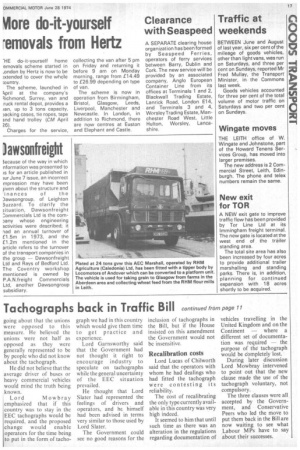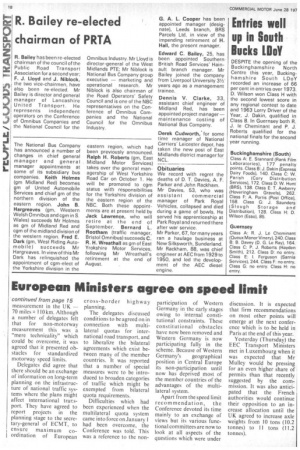Tachographs back in Traffic Bill
Page 19

Page 20

If you've noticed an error in this article please click here to report it so we can fix it.
going about that the unions were opposed to this measure. He believed the unions were not half as opposed as they were generally represented to be by people who did not know about the tachograph.
He did not believe that the average driver of buses or heavy commercial vehicles would mind the truth being known.
Lord Mowbray emphasized that if this country was to stay in the EEC tachographs would be required. and the proposed change would enable operators for the time being to put in the form of tacho graph we had in this country which would give them time to get practice and experience.
Lord Garnsworthy said that the Government had not thought it right to encourage industry to speculate on tachographs while the general uncertainty of the EEC situation prevailed.
He thought that Lord Slater had represented the feelings of drivers and operators, and he himself had been advised in _terms very similar to those used by Lord Slater.
The Government could see no good reasons for the inclusion of tachographs in the Bill, but if the House insisted on this amendment the Government would not be insensitive,
Recalibration costs
Lord Lucas of Chilworth said that the operators with whom he had dealings who had fitted the tachograph were contesting its reliability.
The cost of recalibrating the only type currently available in this country was very high indeed.
It seemed to him that until such time as there was an alteration in the regulations regarding documentation of vehicles travelling in the United Kingdom and on the Continent — where a different set of documentation was required — the purpose of the tachograph would be Completely lost.
During later discussion Lord Mowbray intervened to point out that the new clause made the use of the tachograph voluntary, not compulsory.
The three clauses were all accepted by the Government, and Conservative Peers who led the move to put them back in the Bill are now waiting to see what Labour MPs have to say about their successes.
The National Bus Company has announced a number of changes in chief general manager and general manager appointments at some of its subsidiary bus companies. Keith Holmes (gm Midland Red) becomes gm of United Automobile Services and chief gm of the northern division of the eastern region. John B. Hargreaves (gm. Western Welsh Omnibus and cgm in S. Wales) succeeds Mr Holmes as gm of Midland Red and cgm of the midland division of the western region. Fred E. Dark (gm, West Riding Automobile) succeeds Mr Hargreaves. In view of this Mr Dark has relinquished the appointment of cgm-elect of the Yorkshire division in the eastern region, which had been previously announced. Ralph H. Roberts (gm, East Midland Motor Services) takes over the general managership of West Yorkshire Road Car on October 1. He will be promoted to cgm status with responsibilities for the Yorkshire division of the eastern region of the NBC. Both these appointments are at present held by Jack Lawrence, who will retire at the end of September. Bernard L. Rootham (traffic manager, Bristol Omnibus) succeeds C. R. H. Wreathall as gm of East Yrokshire Motor Services, following Mr Wreathall's retirement at the end of August. G. A. L. Cooper has been appointed manager (designate), Leeds branch, BRS Parcels Ltd, in view of the impending retirement of H. Hall, the present manager.
Edward C. Bailey, 25, has been appointed Southern • British Road Services' Hainault branch manager. Mr Bailey joined the company from Liverpool University 31/2 years ago as a management trainee.
Dennis V. Clarke, 33, assistant chief engineer of Midland Red, has been appointed project manager— maintenance costing of National Bus Company.
Derek Cudworth,' for some time manager of National Carriers' Leicester depot, has taken the new post of East Midlands district manager for NCL.












































































































